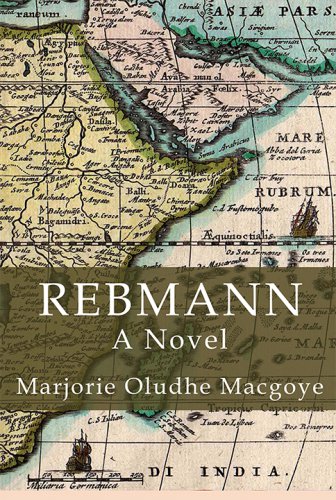
About the Author
Marjorie King was born in Southampton, England and moved to Kenya in 1954 in the service of Church Missionary Society Bookshop. There she married Daniel Oludhe Macgoye, a clinical officer. She worked as an editor for church publishers and the Institute of African Studies at the University of Nairobi, and she contributed to Rabai to Mumias (Uzima Press, Nairobi) recording 150 years of Anglican activity. Macgoye has published seven novels. Coming to Birth was awarded the Sinclair Prize for Fiction in London, 1986. A Farm Called Kishinev received the Jomo Kenyatta Prize for Literature in Nairobi, 2007.
REBMANN: A Novel
Marjorie Oludhe MacgoyeSlow Read, 2014
290 Pages
ISBN 978-09915047-3-2 Paperback
For BULK ORDERS, order directly from New Academia Publishing.
Queries: orders@newacademia.com
About the Author
Marjorie King was born in Southampton, England and moved to Kenya in 1954 in the service of Church Missionary Society Bookshop. There she married Daniel Oludhe Macgoye, a clinical officer. She worked as an editor for church publishers and the Institute of African Studies at the University of Nairobi, and she contributed to Rabai to Mumias (Uzima Press, Nairobi) recording 150 years of Anglican activity. Macgoye has published seven novels. Coming to Birth was awarded the Sinclair Prize for Fiction in London, 1986. A Farm Called Kishinev received the Jomo Kenyatta Prize for Literature in Nairobi, 2007.
About the book
Rebmann is a historical novel based on the life of Johannes Rebmann, 1820-76. It is framed in a series of recollections elicited by questions during his retirement journey.
The author has been collecting material on this subject for 25 years. With missionary experience herself and lifelong commitment to the Anglican Church, she has been able to draw on the recollections of older colleagues as well as the detailed travel and domestic reports of the subject and his contemporaries. Many documents describe events in Zanzibar and the Sultan’s other dominions. Rebmann never left Africa between his arrival in 1846 and retirement voyage in 1875.
His English wife and baby son died at the Coast, as did many eager recruits. The area was never cut off from world events, though inland regions were less accessible. Trading vessels under sail and steam, naval and diplomatic missions and dhows ferrying goods and passengers to Persia, Arabia and Red Sea ports were constantly passing. Fugitives from the Indian Mutiny sought employment there, the American Civil War changed terms of trade and relationship, the Suez Canal and the telegraph service brought profound changes. Missionary travels reflected changes in and between neighboring chiefdoms and prompted early attempts to map geographical features and define linguistic categories.
Dr. J. L. Krapf’s name was more widely known because of his publications and visits to Europe, but it was Rebmann’s patient concern with nurturing the local church which put down deep roots.
Praise
“Although the novel is written in the third person, the bulk of the story consists of memories and reminiscences through the voice of Johannes Rebmann, at the end of his life. Rebmann is in his 50s, but he is in poor health; during his 30 years in East Africa, he has lost a wife, a child, and his eyesight. His missionary efforts have not been particularly successful either, at least not by conventional measures. The novel opens as Rebmann is boarding a ship to return to England, and eventually Germany. During the voyage to Europe, during his debriefing by the mission agency in England, and through his resettlement, second marriage, and death in Germany, we are exposed to lengthy flashbacks that weave together the story of Rebmann’s life, and along with them the story of the first Christian missionary efforts in this part of the world.
Despite disappointments and limited accomplishments during his lifetime, Rebmann is today recognized for laying the groundwork for the later dramatic growth of the Anglican church in Kenya. Macgoye’s book is carefully researched, and the events that it describes are historically accurate. These include the names and roles of all the characters, the often complicated geopolitical reality of East Africa at the time, the theological and social controversies within the missionary community, and Rebmann’s contributions to regional exploration and linguistic study (he was the first European to see and report on the existence of Mt. Kilimanjaro and Mt. Kenya). Much of the information for Macgoye’s writing is based on Rebmann’s extensive diaries, as well as on her additional historical research. What Macgoye adds to the historical account in Rebmann is her own interpretation of the voice, the concerns and motivations, and the mind of Rebmann. He becomes a memorable character, but one who is entirely believable, partly because Macgoye herself was (like him) a CMS missionary to East Africa.”
―J. Roger Kurtz, Professor of English, The College at Brockport, State University of New York
“Mrs Macgoye’s work is a piece of art, a literary artifact. It is an historical novel. Finding historical truth is not her main aim. She presents Rebmann and the people he was related to as living human beings with their own characters, feelings, convictions, objectives. Of course in doing so Mrs Macgoye had to work with her imagination. That is the very task of a novelist. “
―Steven Paas, author of Johannes Rebmann: A Servant of God in Africa before the Rise of Western Colonialism





 Coming Soon
Coming Soon Awards
Awards